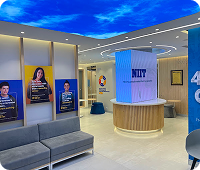
Try our course navigator
Book a visit at our learner hub
“A Learner Hub is an NIIT facility where you can meet Career Advisors, explore programs, and experience NIIT’s learning ecosystem in person.”



Delhi
1st Floor, Chawla House, 19, Nehru Place
Mumbai
2nd Floor, Merchant Chamber, 98 -A, Hill Road
Bengaluru
3rd Floor, HJS Chambers, 92, Richmond Road
Chennai
2nd Floor, House No 137, AC Block, 2nd Ave, Annanagar
Gurugram
NIIT Limited, Plot No 85, Institutional Area, Sector 32
The NIIT advantage
NIIT empowers learners with innovation, expert guidance, and placement assurance, offering trusted leadership in learning and building future-ready skills and careers.

About NIIT Digital
As online and remote learning become mainstream, NIIT Digital provides a robust platform that enhances effectiveness and efficiency. With a mission to deep skill the nation’s youth, it delivers new-age, online, instructor-led tech courses along with placement assurance, empowering learners through quality education and ensuring meaningful transformation for future-ready careers.
Learner speaks


Learner success stories
"The gNIIT program empowered me to transform my passion for coding into a successful career"

Mayank Negi
I successfully completed the 21-day NIIT program, and I am extremely satisfied with the experience. The support from the NIIT team was exceptional, which made learning seamless and effective. Currently, I am working at the Vadgaon Maval branch, Pune, where the staff is also very supportive. I am grateful for the guidance and encouragement I received throughout the program.

Priti Ptil
“The course material and mentoring approach were excellent. Collaborating with peers online was a great experience, and the mentors did an outstanding job of communicating and creating a supportive learning environment. It’s a very solid course, and I learned a lot throughout the journey. Special thanks to all the mentors — Komilla, Lopa, Vinod Raju, Sriraman, and Kshijit — and to the placement team for helping me secure a position. A heartfelt thanks to Shraddha Ma’am for her constant support during the placement process.”

Baathuku Rishika
NIIT is the best platform for job opportunities. With NIIT's help, I received the best placement today, and their guidance has enhanced my knowledge. For me, NIIT is the best job placement platform in India. Thank you NIIT.

Patel Smit Vikrambhai
"Making a career switch is never easy. Joining Niit was one of the best decisions I have made during this crucial stage of my life. I would like to thank the NIIT for such an incredible course. The course was designed such that there is enough time for practice and the given assignments are challenging enough. The mentors here are very supportive through out the course.The placement team is doing a great job by conducting multiple sessions to help us prepare for the job interviews. The package provided to me is higher than what was promised."

SANDEEP GANDE
My journey at NIIT has been a transformative experience filled with learning & growth that have significantly shaped my professional & personal skills. With time, I adapted to the new learning environment & began to appreciate the structured approach of the Program. These institute is a great Platform for New beginners. it gives various options for the students to take step towards Career. From these Course we learn various things about banking & financial industry & their work in money market.

Rahul Poonia
Trusted by 800+ hiring partners
Awards & acknowledgement
Recognised as
Best Tech Skilling EdTech Company
by Times Business Awards in 2022
Recognised as
Trusted Brand in Education
by Prime Insights in 2023
Recognised as
Gold Winner – Learning Excellence
by Global Learning Awards
Global Recognition in Education & Skilling
Our journey of 40+ years has been recognised with prestigious awards across continents — reaffirming our commitment to shaping futures and empowering learners worldwide.











